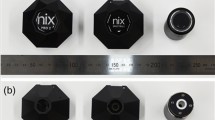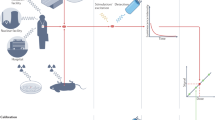Abstract
With British domestic colour television receivers, the genetic dose from X-rays is negligible, and the X-ray emission from individual sets is normally well within the internationally accepted limit.
This is a preview of subscription content, access via your institution
Access options
Subscribe to this journal
Receive 51 print issues and online access
$199.00 per year
only $3.90 per issue
Buy this article
- Purchase on Springer Link
- Instant access to full article PDF
Prices may be subject to local taxes which are calculated during checkout
Similar content being viewed by others
References
Recommendations of the International Commission on Radiological Protection (revised December 1, 1954), Brit. J. Radiology, Supplement 6(1955).
British Standard 415 (1957; revised 1967).
Recommendations of the International Commission on Radiological Protection: Report of Committee III, ICRP Publication 3 (Pergamon Press, 1960).
The Hazards to Man of Nuclear and Allied Radiations: A Second Report to the Medical Research Council (HMSO, London, 1960).
Braestrup, C. B., and Mooney, R. T., Science, 130, 1071 (1959).
Ciuciura, A., J. Brit. IRE, 469 (August 1959).
Author information
Authors and Affiliations
Rights and permissions
About this article
Cite this article
O'RIORDAN, M., CASBOLT, P. X-rays from Domestic Colour Television Receivers in Britain. Nature 228, 420–421 (1970). https://doi.org/10.1038/228420a0
Received:
Revised:
Issue Date:
DOI: https://doi.org/10.1038/228420a0
Comments
By submitting a comment you agree to abide by our Terms and Community Guidelines. If you find something abusive or that does not comply with our terms or guidelines please flag it as inappropriate.



